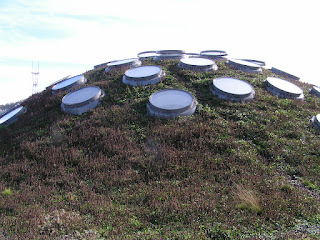What is it?
The Future Farmstead is an energy independent experimental farm and farmstead dedicated to developing and demonstrating advanced technologies which will enhance farmer efficiency to achieve the nation’s future energy, food, and environmental requirements.
Future Farmstead is a research, extension, and education initiative with many public and private partners, led by the University of Georgia. The program is dedicated to advancing on-farm energy generation and conservation in the Southeast focusing on efficiencies as a way to save energy and protect our natural resources.
Why should I care?
Today, agriculture has the opportunity to transform our economy from one which depends on fossil fuels to one which thrives on renewable energy. Within 15 years the majority of advanced biofuels are likely to come from a variety of plant-based carbon sources including cellulose and lignin, and this is where Southeastern agriculture and forestry shine.
Efficient methods to convert biomass to biofuels are now being commercialized, yet to remain competitive the nation's bio-fuels industry must constantly improve biomass growth, harvesting and conversion methods, in an environmentally sound way. The SE will also employ energy capture and conversion from solar, wind, water and farm byproducts. Georgia has a great opportunity to be a net exporter of energy.
As energy prices continue to rise, farmers must increase energy use efficiency. Improvements in energy conservation are important state and national goals. Over the next 10 years we will see net energy outputs from agriculture rise as farm machinery becomes more efficient and cultural practices save time, energy and natural resources. According to the United States Department of Agriculture, 15 percent of agricultural production costs are energy related. To have an immediate impact on this climbing cost and reduce our fossil fuel dependence we must improve energy efficiency. With public and private partners UGA’s Future Farmstead team will look to advanced communication, sensor, automation, and genetics to better manage a more suitable production environment. By making farms cleaner, more efficient, and more profitable we will reduce our dependence on foreign fuels.
 After watching several videos and checking out loads of pictures of DC's Solar Decathlon, it seems that there is a recurring theme in many of the houses. Edible. Landscape. I really enjoy the aesthetic appeal of the various colors that plants and flowers can add to a landscape. It's even better when growing plants locally means there is a smaller amount of petroleum is tied up in each edible plant. Just think about the freshness, too!
After watching several videos and checking out loads of pictures of DC's Solar Decathlon, it seems that there is a recurring theme in many of the houses. Edible. Landscape. I really enjoy the aesthetic appeal of the various colors that plants and flowers can add to a landscape. It's even better when growing plants locally means there is a smaller amount of petroleum is tied up in each edible plant. Just think about the freshness, too! 


